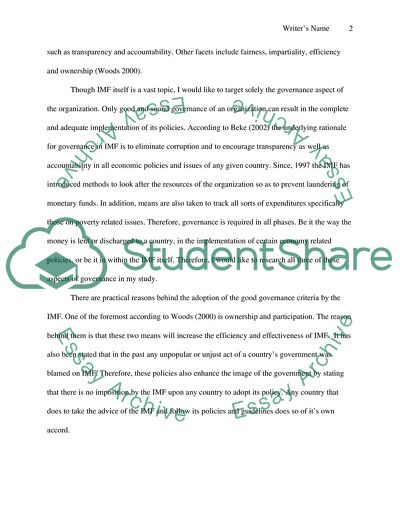
- Home
- Free Samples
- Premium Essays
- Editing Services
- Extra Tools
- Essay Writing Help
- About Us
- Studentshare
- Subjects
- Miscellaneous
- International public administration
International public administration - Essay Example

- Subject: Miscellaneous
- Type: Essay
- Level: Undergraduate
- Pages: 4 (1000 words)
- Downloads: 0
- Author: paolo00
Extract of sample "International public administration"
Good governance is a set of principles that have been adopted by both the World Bank and the IMF to guide them and help them to achieve their objectives and goals in their member countries. The current scenario is that these organizations now are in the process of applying similar standards as the, good governance techniques to various other aspects of the institution, such as transparency and accountability. Other facets include fairness, impartiality, efficiency and ownership (Woods 2000). Though IMF itself is a vast topic, I would like to target solely the governance aspect of the organization.
Only good and sound governance of an organization can result in the complete and adequate implementation of its policies. According to Beke (2002) the underlying rationale for governance in IMF is to eliminate corruption and to encourage transparency as well as accountability in all economic policies and issues of any given country. Since, 1997 the IMF has introduced methods to look after the resources of the organization so as to prevent laundering of monetary funds. In addition, means are also taken to track all sorts of expenditures specifically those on poverty related issues.
Therefore, governance is required in all phases. Be it the way the money is lent or discharged to a country, in the implementation of certain economy related policies, or be it in within the IMF itself. Therefore, I would like to research all three of these aspects of governance in my study. There are practical reasons behind the adoption of the good governance criteria by the IMF. One of the foremost according to Woods (2000) is ownership and participation. The reason behind them is that these two means will increase the efficiency and effectiveness of IMF.
It has also been stated that in the past any unpopular or unjust act of a country’s government was blamed on IMF. Therefore, these policies also
...Download file to see next pages Read MoreCHECK THESE SAMPLES OF International public administration
Globalization Impact on Public Administration
Public Administration and Civil Service Reform UNDP Cambodia. Case Study
International Public Law
Policy Formulation and Implementation by International Public Administration Organizations
Administrative Decision Making & The Constitution at Work
Towards an Effective Public Administration
Corruption in Western Australia
Corruption in the Law Enforcement System in Western Australia

- TERMS & CONDITIONS
- PRIVACY POLICY
- COOKIES POLICY